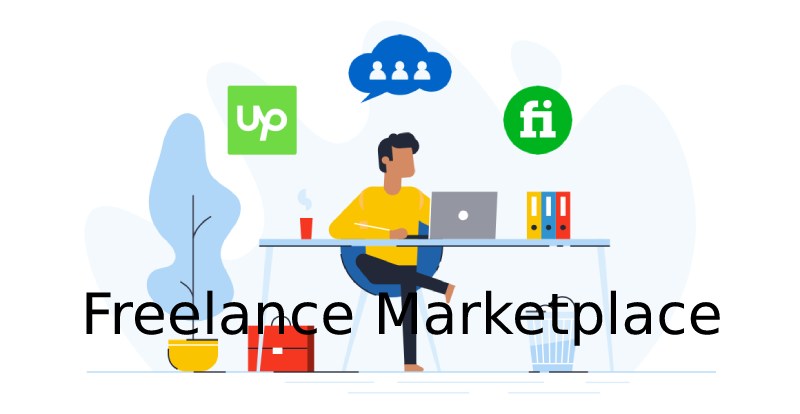Unlocking the Benefits of Freelance Marketplaces: A Guide for Clients and Freelancers

Unlocking the Benefits of Freelance Marketplaces: A Guide for Clients and Freelancers
As the world becomes increasingly connected, more and more people are turning to freelance work as a way to earn a living. Freelance marketplaces have emerged as a popular way to connect clients with freelancers, making it easier for both parties to find and work with each other.
A freelance marketplace is an online platform that connects businesses and individuals with freelancers who can provide specific services. These platforms typically offer various services, such as graphic design, writing, programming, and virtual assistance.
Freelancers can create a profile on the platform, outlining their skills and experience, and can bid on projects posted by clients. Clients can review freelancer proposals and choose the one that best meets their needs. Once the project is awarded, the freelancer completes the work and submits it to the client for approval. The platform typically takes a commission on the payment made to the freelancer.
The freelance marketplace provides a convenient way for businesses to access a global talent pool without hiring full-time employees. For freelancers, it offers a way to find clients and work flexibly. The marketplace acts as an intermediary, providing a secure platform for both parties to communicate, collaborate, and complete transactions.
Table of Contents
Why are freelance marketplaces so popular?
Freelance marketplaces have become famous for several reasons.
Firstly, they provide a cost-effective solution for businesses accessing a global talent pool. Instead of hiring full-time employees, businesses can hire freelancers on a project-by-project basis, which can be more cost-effective in the long run.
Secondly, freelance marketplaces provide flexibility for both employers and employees. Employers can hire freelancers for short-term projects, allowing them to scale up or down their workforce as needed. Freelancers, on the other hand, can choose the projects they want to work on and have the flexibility to work from anywhere in the world.
Thirdly, freelance marketplaces provide a platform for both employers and employees to build their professional networks. Employers can find talented individuals with specialized skills, and freelancers can build their portfolios by working with various clients.
Lastly, freelance marketplaces provide a secure and efficient way for employers and employees to collaborate and complete transactions. These platforms typically have built-in tools for communication, project management, and payment processing, which can save both parties time and reduce the risk of fraud.
Freelance marketplaces benefit employers and employees by providing a flexible, cost-effective, and secure way to access a global talent pool and build professional networks.
Types of freelance marketplaces
Freelance marketplaces cater to various industries, skill sets, and project types. Here are some examples:
● General freelance marketplaces
These platforms offer various services, including graphic design, writing, programming, and virtual assistance. Examples include Upwork, Freelancer, and Fiverr.
● Specialized freelance marketplaces
These platforms cater to specific industries or skill sets. Examples include Toptal (for top-tier software developers and designers), 99designs (for graphic design), and Voices (for voice-over artists).
● Project-based freelance marketplaces
These platforms focus on specific projects, such as video production, website design, or content creation. Examples include ProductionHUB (for video production), Behance (for creative projects), and Contently (for content creation).
● Location-based freelance marketplaces
These platforms connect freelancers with clients in a specific geographic location. Examples include Freelance-Market (for German-speaking countries), Workana (for Latin America), and FreelanceJapan (for Japan).
● Niche freelance marketplaces
These platforms cater to specific niches, such as ethical fashion, sustainability, or blockchain technology. Examples include EthicalJobs, The Good Trade, and Ethlance.
Each freelance marketplace type has advantages and disadvantages, and choosing the right platform based on your specific needs and goals is essential.
Most popular freelance marketplaces
There are many popular freelance marketplaces, each with its strengths and specialities. Here are some of the most famous freelance marketplaces:
1. Upwork is one of the largest and most popular freelance marketplaces, offering various services, including writing, graphic design, programming, and administrative support.
2. Freelancer is another popular platform that connects freelancers with clients in various industries. It has a large user base and offers features such as contests and skills tests to help freelancers showcase their talents.
3. Fiverr is a platform that focuses on small, quick projects with a starting price of $5. It’s famous for creative and digital services like graphic design, writing, and video editing.
4. Toptal is a premium freelance marketplace that connects businesses with top-tier software developers, designers, and financial experts. It has a rigorous screening process to ensure that freelancers have the necessary skills and experience.
5. PeoplePerHour is a platform that focuses on freelance work in the creative and digital industries, including web design, social media marketing, and SEO.
6. Guru is a platform that connects freelancers with clients in various industries, including IT, business, and creative services. It offers a range of payment options, including hourly and fixed-price contracts.
7. 99designs is a platform specializing in graphic design, including logos, packaging, and website design. It has a unique model where clients can launch design contests and choose from multiple design submissions.
These are just a few examples of the most popular freelance marketplaces. Each platform has unique features, pricing, and user base, so it’s essential to research and compares different options before choosing the best fit for your needs.
The development of a freelance marketplace
Here are the typical steps involved in freelance marketplace development:
- Research and Planning: The first step is identifying the target audience, niche, and features required for the freelance marketplace. This involves researching existing marketplaces and identifying gaps in the market.
- Platform Selection: The next step is to select the appropriate technology stack and platform for the development of the marketplace. This includes choosing the programming language, framework, and cloud infrastructure.
- Design and User Experience: Once the platform is selected, the next step is to design the marketplace’s user interface and user experience (UI/UX). This involves creating wireframes, mockups, and prototypes to visualize the flow of the marketplace.
- Development: The development phase involves coding the marketplace using the selected technology stack and integrating features such as user profiles, payment gateways, search functionality, and messaging systems.
- Testing and Deployment: Once the marketplace is developed, it must be thoroughly tested to ensure all features work as intended. This includes testing for security, performance, and scalability. Once testing is complete, the marketplace can be deployed to a production environment.
- Launch and Marketing: Once the marketplace is deployed, it’s time to launch and start marketing it to attract users. This includes creating a launch strategy, optimizing the marketplace for search engines, and leveraging social media and other channels to promote the marketplace.
- Maintenance and Support: The final step is to maintain and support the marketplace to ensure it continues functioning smoothly and attracting users. This involves monitoring performance, fixing bugs, and providing customer support to users.
These are the general steps involved in developing a freelance marketplace, but the actual process may vary depending on the scope and complexity of the project.
The main functionality of the freelance marketplace
Here are some of the must-have features for a freelance marketplace:
- User Registration and Profiles
Allow freelancers and clients to register and create profiles, including skills, experience, and portfolio information.
- Search and Filters
Users can search for freelancers or projects based on keywords, categories, location, and other filters.
- Messaging and Communication
Provide a messaging system that allows clients and freelancers to communicate and negotiate the terms of the project.
- Escrow Payment System
Provide a secure payment system that allows clients to make payments and freelancers to receive payments for completed work. An escrow system can hold payments securely until the job is completed.
- Project Management Tools
Provide project management tools that allow clients to create projects, set deadlines, and track progress. Freelancers can also use these tools to manage their tasks and deliverables.
- Rating and Feedback System
Please provide a rating and feedback system that allows clients and freelancers to rate each other based on their performance and professionalism. This helps build trust and credibility within the marketplace.
- Security and Privacy
Ensure that the marketplace is secure and user data is protected. This includes encryption, data backups, and user privacy policies.
- Mobile Optimization
Optimize the marketplace for mobile devices to ensure that users can access the platform from anywhere.
These are just some of the must-have features for a freelance marketplace. The specific features required may depend on the marketplace’s niche, audience, and goals.
Extra features of freelance marketplaces
Many additional features can be added to improve a freelance marketplace. Here are some examples:
- Portfolio Showcase: Allow freelancers to showcase their work through a portfolio or showcase section, which can help them attract clients.
- Project Bidding: Allow freelancers to bid on projects, competing against each other to offer the best price and quality of work.
- Video Interviewing: Allow clients to conduct video interviews with potential freelancers, helping them to evaluate their communication skills and work style.
- AI-Powered Matching: Use artificial intelligence to match freelancers with projects based on their skills, experience, and preferences.
- Invoicing and Expenses: Provide freelancers with tools (which may include everything from a tax calculator to an invoice generator) to manage their invoices and expenses, helping them to track their earnings and expenses for tax purposes.
- Legal Support: Provide legal support and advice for freelancers and clients, helping them to navigate legal issues such as contracts and intellectual property rights.
- Community and Networking: Build a community and networking features within the marketplace, allowing users to connect with other freelancers and clients, share knowledge, and collaborate.
- Professional Development: Offer training, courses, and resources to help freelancers improve their skills and grow their businesses.
These are just a few extra features that can be added to improve a freelance marketplace. The specific features required may depend on the marketplace’s niche, audience, and goals.
Conclusion

Freelance marketplaces have revolutionized the way people work, providing a platform that connects clients with freelancers from all over the world. With the right tools and features, freelance marketplaces can make it easy for clients and freelancers to find and work with each other, regardless of location or time zone.
For clients, freelance marketplaces offer a cost-effective way to find high-quality freelancers for their projects, with a range of project management tools and payment systems to help ensure success. For freelancers, freelance marketplaces offer a way to find new clients and projects and showcase their skills and experience to a global audience.
With the growing demand for freelance work, freelance marketplaces are only set to become more important in the years ahead. By providing the right tools and features, freelance marketplaces can help clients and freelancers to succeed in the new world of work, driving growth, innovation, and prosperity for all.
Also read: Best AI Tools Right Now





